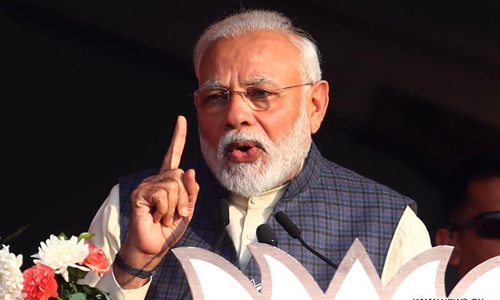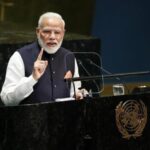India on Monday banned 59 Chinese apps, saying they are “prejudicial to sovereignty and integrity of India, defense of India, security of state and public order.” Given the recent boycott of Chinese products and companies in India, we can see that anti-China sentiment among Indians stems from something more than just the border clashes between the two countries. It reflects the rise of Hindu nationalism and the prominence of India’s ambition and pursuit to become a major power.
With its economic growth, India has begun to show more resolve to be a world leader. Some Indian elites and ordinary people want more than ever to compete with China both economically and militarily.
Current rise of Hindu nationalism is rare in history, as India faces no foreign invasion or bullying now. The core of this rising nationalism is to build a big country of Hinduism. Indians believe they have to win over China before they can achieve this goal.
Secondly, changes in India’s internal affairs have brought about great uncertainties. This anti-China posture has become one of the main means for certain individuals to forge social consensus. The once pluralistic secular Indian society is being turned into one dominated by Hinduism. Despite great divergences in the country, the ruling Bharatiya Janata Party is pushing forward this transition— not only with a new narrative but also with specific policies and national actions. For example, some Hindus believe they should take advantage of the contradictions with Muslims and anti-China stances to unite people.
Moreover, Indian Prime Minister Narendra Modi has set a GDP target of $5 trillion by 2024. This would make India the third-largest economy of the world, laying a solid economic foundation for rising Hindu nationalism.
India’s mentality to take a greater role in world affairs has arisen from political needs and the demand of Indian people who deeply believe in Hindu mythology. Due to their unique culture, many Indians believe their country is a global power.
No matter from history or reality, elements of India’s politics and society are fertile for growing anti-China sentiments. It is understandable that India views the 1962 Sino-Indian war as a historic humiliation. But it would be dangerous if New Delhi resents Beijing and launches anti-China waves from national education and strategic levels.
In recent years, Chinese companies have cooperated with South Asian countries by investing in local basic infrastructure construction. China has no intention to squeeze India’s strategic space. It instead aims to explore ways of peaceful co-existence as both countries rise.
But many Indians view China’s moves as contradictory to their own strategic understanding. They reckon neighboring countries as their own “backyard” and believe the entire Indian Ocean belongs to India.
In terms of strategic orientation, China hopes that both of the two populous and emerging economies will coordinate carefully as good neighbors—and raise all rafts together.
But the strategic objectives of some Indians are to contain and surpass China with the help of the West.
This latter course of action is fanned in certain Op-Eds in Indian media and by selected political actors. Clearly, tensions are exacerbated by this pressure. And hence there is relentless support for India to join the US, Australia and Japan to contain China.
In terms of economic cooperation, India has remained skeptical of China despite taking advantage to develop with China’s economic momentum. This has led to India’s capricious China policy.
Externally, US-led Western countries hope to use India’s rise as a lever against China.
Washington is pleased to lead China-India relations into competition and conflicts. In point of fact, the West has recklessly smeared and interfered in China-India relations, such as labeling India “the world’s biggest democracy,” talking up the “Mumbai model,” and unscrupulously showing partiality to India amid China-India disputes.
The US, in particular, is seducing India to counterbalance China and the concept of the Indo-Pacific Strategy is turning into a reality. For quite a number of Indian elites, they are more inclined to work with the West strategically. They believe that by joining the US camp to contain China, they are now a world power on equal footing.
All in all, a China-India relationship centered on economic cooperation and people-to-people exchanges will never satisfy certain anti-China Indian nationals. But in terms of diplomacy, leadership exchanges and military security, the two countries must reach a consensus on peace and stability as the basis for common development.
The author is former correspondent of the Global Times in India. opinion@globaltimes.com.cn
Indian Prime Minister Narendra Modi addresses his Bharatiya Janata Party’s campaign rally in support of East Delhi candidates ahead of Delhi state elections in Delhi, India, Feb. 3, 2020. (Xinhua/Partha Sarkar)




